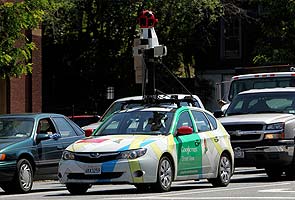- Home
- Internet
- Internet News
- Denials over Google Street View
Denials over Google Street View

The company on Tuesday released a trove of documents related to a federal investigation of its Street View mapping project. Although the project was intended to photograph the world's streets, from 2007 to 2010 Google gathered unencrypted Internet data from wireless networks, including the content of private communications, as its specially equipped cars passed through neighborhoods.
Among the documents released Tuesday are sworn declarations by nine people - their names and titles redacted but most of whom appear to be Google engineers - who said they were not aware of the data collection either because it was not part of their job or they did not review the project documentation, even when it was provided to them.
Also Tuesday, Google confirmed that the Information Commissioner's Office in Britain had reopened its investigation of the Street View project and had asked the company for additional information about the data it collected there.
In April, the Federal Communications Commission said Google had "deliberately impeded and delayed" its inquiry into the data collection and assessed the company a $25,000 fine. The documents released Tuesday were originally provided to the F.C.C. as part of its investigation into Street View. Employee names were redacted; in a few cases, nearly the entire document was blacked out.
While each of the employees who provided sworn declarations acknowledged participating in some aspect of Street View, nearly all said they first became aware that the company was collecting Internet data only when it was publicly reported in May 2010.
For example, one person whose job was to review the computer code that operated the data collection program said that while he checked syntax and debugged the code, he had "no recollection of reviewing the Wi-Fi project design document" and that "it was not part of my duties to do so."
Another said, "I am aware there was a design document prepared for the Wi-Fi collection, but I do not recall reading it."
Jill Hazelbaker, a spokeswoman for Google, said the failure by multiple engineers to review the project was "a mistake," adding, "Clearly there was a process breakdown."
Google's collection of private Internet communications became public when German regulators began looking into Street View in that country. At first, the company blamed a programming mistake by an engineer, saying his experimental software was accidentally included in Street View - and stressing that the data was never intended for or used in any Google products.
But the F.C.C.'s report said the gathering of the so-called payload data was not the work of a lone engineer. It was, the report said, put into motion as part of an engineer's "20 percent" time, which Google gives employees to work on their own projects. And the report found that the engineer "specifically told two engineers working on the project, including a senior manager, about collecting payload data."
That finding is not necessarily inconsistent with the Google employee declarations released on Tuesday because several told the F.C.C. that they did not recall reviewing the documents - not that they never received them. The F.C.C. is still considering media requests to release more documents related to its investigation.
The engineer who designed the data-collection program, Marius Milner, of Palo Alto, Calif., has refused to answer questions from investigators, citing his Fifth Amendment right. There are no known criminal investigations of the employee or the company.
After the F.C.C. released its report saying that others at Google were made aware of the data collection, privacy regulators in Europe said they were considering reopening their investigations. Jacob Kohnstamm, a Dutch regulator who is the chairman of the top European privacy panel, said some regulators in Europe felt misled by Google as to the parameters of Street View.
On Tuesday, The Register, a British publication that covers technology, reported that the Information Commissioner's Office had reopened its investigation of Street View. The publication said the commissioner's office had sent a letter to a Google executive inquiring about aspects of the program.
Ms. Hazelbaker of Google said the company had received the letter and intended to cooperate. "We are of course happy to answer their questions, but it is important to bear in mind that our project leaders have always said that they did not want this payload data and indeed they never even looked at it," she said.
Google, with the permission of the British commissioner's office, has already deleted the Wi-Fi payload data it collected in Britain. The office, near Manchester, England, was closed Tuesday evening and officials there could not be reached for comment.
Google told the F.C.C. several times during the agency's investigation that the collected data was not used and was viewed by few individuals. In an April 2011 letter released Tuesday the company said: "Google has not disclosed the data to any third party; has not used the data in any product or service; and has not used the data for the benefit of any person or entity in any way."
While the company acknowledged that the collection of Wi-Fi payload data did not meet its standards, Google also maintained that it "did not violate Section 705 of the Communications Act or any other law" - a conclusion it said other federal agencies, including the Federal Trade Commission, had also reached.
Copyright 2012, The New York Times News Service
Get your daily dose of tech news, reviews, and insights, in under 80 characters on Gadgets 360 Turbo. Connect with fellow tech lovers on our Forum. Follow us on X, Facebook, WhatsApp, Threads and Google News for instant updates. Catch all the action on our YouTube channel.
Related Stories
- Samsung Galaxy Unpacked 2026
- iPhone 17 Pro Max
- ChatGPT
- iOS 26
- Laptop Under 50000
- Smartwatch Under 10000
- Apple Vision Pro
- Oneplus 12
- OnePlus Nord CE 3 Lite 5G
- iPhone 13
- Xiaomi 14 Pro
- Oppo Find N3
- Tecno Spark Go (2023)
- Realme V30
- Best Phones Under 25000
- Samsung Galaxy S24 Series
- Cryptocurrency
- iQoo 12
- Samsung Galaxy S24 Ultra
- Giottus
- Samsung Galaxy Z Flip 5
- Apple 'Scary Fast'
- Housefull 5
- GoPro Hero 12 Black Review
- Invincible Season 2
- JioGlass
- HD Ready TV
- Latest Mobile Phones
- Compare Phones
- Tecno Pova Curve 2 5G
- Lava Yuva Star 3
- Honor X6d
- OPPO K14x 5G
- Samsung Galaxy F70e 5G
- iQOO 15 Ultra
- OPPO A6v 5G
- OPPO A6i+ 5G
- Asus Vivobook 16 (M1605NAQ)
- Asus Vivobook 15 (2026)
- Brave Ark 2-in-1
- Black Shark Gaming Tablet
- boAt Chrome Iris
- HMD Watch P1
- Haier H5E Series
- Acerpure Nitro Z Series 100-inch QLED TV
- Asus ROG Ally
- Nintendo Switch Lite
- Haier 1.6 Ton 5 Star Inverter Split AC (HSU19G-MZAID5BN-INV)
- Haier 1.6 Ton 5 Star Inverter Split AC (HSU19G-MZAIM5BN-INV)







![[Partner Content] OPPO Reno15 Series: AI Portrait Camera, Popout and First Compact Reno](https://www.gadgets360.com/static/mobile/images/spacer.png)









